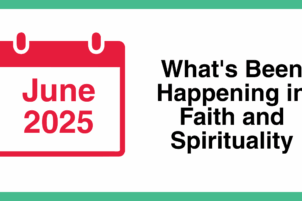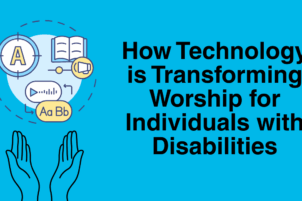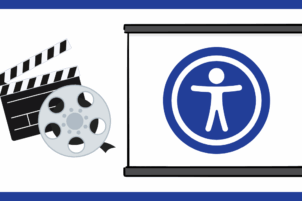Short film series explores the intersection of disability and prayer in the Jewish community
Los Angeles, May 13, 2021 – Justin Borses, a journalist with cerebral palsy who works at Moorpark University, stars in his own segment of “What Do You Pray For?” The film was made by Ben Rosloff, a talented emerging filmmaker on the Autism spectrum who serves as a Jewish Inclusion Fellow in RespectAbility’s National Leadership Program.
”What Do You Pray For?” is a series of short interviews of Jews with disabilities who tell viewers in their own words what they pray for and what prayer means to them. The project features Jews with various disabilities from across the United States, with a myriad of different connections to their Jewish identity.
The series focuses on the universal nature and themes of prayer, as well as the hopes and dreams of people with disabilities. The interviews reveal the need for inclusion and a connection to the community. All interviewees provided valuable insights on their disability experience, understanding it to be an integral part of themselves, presenting challenges and opportunities.
Broadcaster and Journalist Justin Borses is a member of the National Disability Speakers Bureau at RespectAbility. While working at his old school, he covered events for football and basketball. One of the most influential parts of his life, however, has to do with his disability identity. He was born with Cerebral Palsy on February 19th, 2000.
Born three months premature, and given less than a five percent chance of survival, he overcame the odds. Through the course of Borses first 10 years of life, he learned to navigate the world. He used a walker in the early years, slowly gaining strength through countless hours of physical and occupational therapy.
At 10 years old, Borses underwent his first surgery, a truly daunting experience. He woke up in the recovery room in excruciating pain. His feet were turned in, making it painful to walk and his entire lower half was restructured. There was a lot of screaming and crying over the next 12 months as he had to learn how to bend his knees and walk. The emotional toll of learning to walk again included bouts of depression, suicidal thoughts and exhaustion.
Borses is unsure of where he’d be today without the close friends, he made in Hebrew school. He didn’t realize until much later in life, but those people, with whom he’d known since he was 2, are the closest friends he has ever had. They supported him throughout every step of the journey and made Cerebral Palsy their lifelong battle as well.
Despite Borses’ physical limitations, he has devoted his time to learning, broadcasting and writing about sports. He sees a connection between the preparation he puts into his journalism and broadcasting and the preparation the athletes expend on their game. Broadcasting and writing make Borses feel as if he is part of the game.
A transcript of the film is below:
Benjamin Rosloff: My name is Benjamin Rosloff, and I am a filmmaker, editor, and storyteller. And I am living with autism. There are different types of prayers; prayers that praise God, prayers that thank God, prayers that ask for forgiveness, and prayers that ask God for something. There are prayers that are memorized that we recite or sing to familiar melodies. Asking questions is how we learn about people’s hopes and dreams and what kind of world they want to live in.
Hello, this is Justin Borses. He is a broadcaster and journalist for Moorpark College. and I want to thank you for letting me interview you today.
Justin Borses: You’re very welcome Benjamin, happy to be here.
Rosloff: Do you pray?
Borses: For me, I’m more of a spiritual person. I can sit in a synagogue, and listen to the prayers, and listen to the music that’ choir might sing. I’ve actually sung in the choir in the synagogue myself, and sort of just being in that environment, sort of take it in, and, you know, ask me to take a step back and be with the people I love.
Rosloff: Do you recite prayers that you have learned or memorized, or do you have personal prayers?
Borses: I’ve done both. Maybe you want to have, you know, a good start in a fresh job you’ve just been hired to, and for me, you know, every personal prayer is different for every individual.
Rosloff: Is your disability something you refer to in your prayers?
Borses: It depends on the scenario, if there’s something that’s going on in my life that I feel, you know, I really need to think about something, then maybe I might point to that in my prayers, but you know, if I’m going about a day-to-day routine, and I’m, you know, optimistic that, you know, I’m not depressed, or I’m not feeling something that might make me struggle, then I might not refer to it as much.
Rosloff: What do you think the difference is between a wish and a prayer?
Borses: A wish, you sort of put it out there in the world, but you don’t actually, you know, take steps to achieve it as much. A prayer, you can sort of visualize, you’ve maybe able to create steps, you can speak to people who might help you along the way.
Rosloff: Do you think people with disabilities prayers are different than prayers of non-disabled people?
Borses: I think everybody looks for love, I think everybody looks for acceptance. I think for people like us, it might be harder to achieve in some areas, so we might either pray more or we might look towards other people for help, but I think the basic fundamental, human rights, and rights that we all want are generally the same thing, which is to be on an even playing field, and enjoy the same things that other people can enjoy.
Rosloff: What do you pray for?
Borses: It’s more about, you know, the health of the family, making sure everybody’s okay, I want to continue to do well in my career, you know, with broadcasting, I want to continue to make waves in that department, and I want to be able to, you now, start seeing people again, I think a lot of people regardless of what religion you practiced have been praying that the pandemic ends.
Rosloff: Judaism encourages questions. It is how we learn, how we grow, and how we gain an understanding of ourselves, and our relationship to God.
The individuals featured in the “What Do You Pray For” series include:
- Erika Abbott: Writer / Award-Winning Poet
- Ariella Barker: Attorney, Policy Advisor and Communications Specialist
- Justin Borses: Former College Student and employee at Moorpark College
- Lee Chernotsky: Founder and CEO, ROSIES Foundation
- Samantha Elisofon: Award-Winning Actress (“Keep the Change”) and member of EPIC Players, A Neuro-inclusive Theater Company in Brooklyn
- Alex Howard: Entertainment Media and Jewish Inclusion Fellow in RespectAbility’s National Leadership Program
- Matan Koch: Director of RespectAbility California and Jewish Leadership
- Amy Rosenfeld-Kass: Teacher from The Saul and Carole Zabar Nursery School at the JCC
- Ben Rosloff: Communications and Jewish Inclusion Fellow in RespectAbility’s National Leadership Program
- Rachel Rothstein: 4th year Rabbinical Student at the Hebrew Union College Jewish Institute of Religion
- Barry Shore: Ambassador of Joy and Successful Serial Entrepreneur
- Ari Sloan: Member of EPIC Players who is living with Autism
- Joshua Steinberg: Program Associate for RespectAbility California and Jewish Leadership
- Dr. Brendan Stern: Assistant Professor of American politics and the Executive Director of the Center for Democracy in Deaf America at Gallaudet University
- Rabbi Lauren Tuchman: Rabbi, Public Speaker, Spiritual Leader and Educator
- Blair Webb: System Change Youth Advocate at MEET THE BIZ and former Jewish Inclusion Fellow in RespectAbility’s National Leadership Program
- Aaron Wolf: Co-founder of Howling Wolf Productions and Award-winning Actor, Director, Speaker, and Activist
Rosloff, a filmmaker who is active in Jewish life and has been to Israel, grew up in Great Neck, NY and earned a BFA in Electronic Media from Long Island University. He has produced films for a variety of organizations, including his documentary short “Can I Call You?!” screened in the United States and Russia during an internship with Downtown Community Television Center. Rosloff also has co-produced, edited and screened multiple films for the United Nations. These include a film for World Autism Awareness Day, where Rosloff interviewed then-Secretary General Ban-Ki Moon, as well as “#Envision 2030” for Disability Awareness Day. Rosloff currently is looking for a job in video production and/or editing. His LinkedIn is https://www.linkedin.com/in/benjamin-rosloff-95324011a. You can reach him via Benjamin.Rosloff@gmail.com.
About RespectAbility: RespectAbility is a nonprofit organization that fights stigmas and advances opportunities so people with disabilities can fully participate in all aspects of community. Founded by members of the Jewish Funders Network, it is the world’s largest nonprofit one-stop-shop on Jewish disability inclusion. RespectAbility knows that people with disabilities and their families have the same hopes and dreams as everyone else. www.respectability.org, www.respectability.org/resources/faith-inclusion







